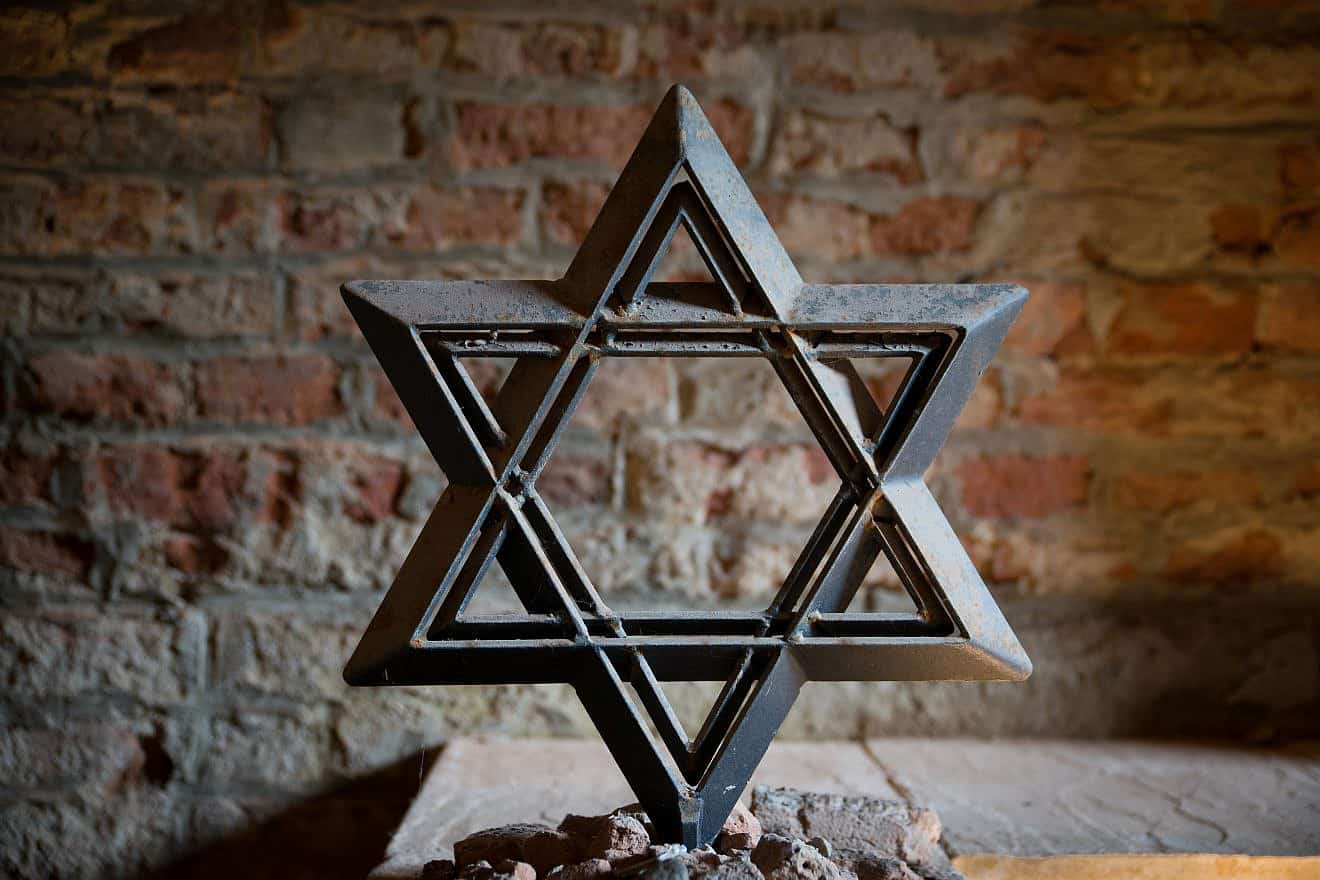Magen David (“Star of David”). Credit: Dziurek/Shutterstock.
In 1990, just as the age of the Internet was beginning, the term “Godwin’s law” was coined by author Mark Godwin. He observed that the longer any online discussion goes, the more likely it is that someone will make a comparison of something to Adolf Hitler and the Nazis. And the person who goes there first usually loses the argument. But Godwin, who is also credited with the invention of the term “meme,” was more prescient than he could have known.
In the ensuing decades, the proliferation of Holocaust and Nazi analogies became commonplace. Partly due to the massive growth in Holocaust education in the United States that sought to universalize the Nazi war to exterminate the Jews, ordinary prejudice was denounced as the first step towards another Auschwitz. Regrettably, this has given rise to an “anyone I don’t like is Hitler” rule on both the right and left in which political differences are compared to Nazi Germans.
But while we are right to demand that the Holocaust be treated as a singular event that should never be mistaken for mere political quarrel, that doesn’t mean that it can’t be compared to historical events in which actual genocide, as well as movements with genocidal intentions, are involved. The genocides in Cambodia and Rwanda, for example, in which entire populations were marked for death does bear a resemblance to Hitler’s “Final Solution.”
Then came the events of Oct. 7. In committing the largest mass slaughter of Jews since the Holocaust and committing barbaric atrocities on men, women and children, including rape and torture, Hamas made it impossible not to think about the legacy of Nazis. Even those of us who have been most critical of Holocaust comparisons are now forced to concede that we’ve arrived at a moment when doing so is not only appropriate but necessary.
An apt comparison
And that is exactly what many supporters of Israel are doing as they seek to push back against the horrifying efforts to downplay or justify Hamas’s crimes by a growing anti-Jewish movement making its voices heard on the streets of the world’s cities as well as on college campuses.
One who has not shied away from this is Gilad Erdan, Israel’s ambassador to the United Nations. Erdan has risen to the occasion during the current crises speaking out boldly against the Jew-hatred and prejudice at the world body in the wake of the Oct. 7 atrocities. But when the United Nations refused to condemn the mass murder in Israel, Erdan had had enough. He said he would don a Holocaust-style yellow Magen David (“Star of David”) with the word “Jude” until it did so.
He has been applauded by those who believe he is right to remind the world body that the indifference to Israeli victims today is reminiscent of the world’s silence and inaction during the Holocaust. But not everyone is cheering for him.
Some “senior officials” in the Israeli Foreign Ministry—always a bastion of defenders of a belief in getting along with Israel’s enemies rather than confronting them—denounced him in the left-wing newspaper Haaretz for what the anonymous diplomats described as a political stunt.
More importantly, Erdan’s gesture was also furiously criticized by Dani Dayan, the head of the Yad Vashem World Holocaust Remembrance Center in Jerusalem. Dayan, who had already publicly cautioned against using Holocaust comparisons when speaking of Hamas, thinks that doing so belittles or marginalizes the past. He claimed that the analogy was somehow an insult to Holocaust survivors. He also bizarrely argued that any discussion of Hamas and the Holocaust must wait “until sufficient research is done delving into the underlying aspects of these two ideologies.”
That makes no sense. There is no mystery about the “underlying aspects” of Hamas ideology. The Islamist terror group is quite open about its goals of eradicating Israel and its Jewish population, just as the Nazis intended to.
Dayan is no Holocaust scholar but was awarded the prestigious post as a consolation prize after a career in business, politics and diplomacy. He started out on the political right as an advocate for the settlement movement. But ever since landing at Yad Vashem, he has been demonstrating all of the usual symptoms of that peculiar malady that affects right-wingers once they get a taste of being treated as respected figures by the left-wing establishment.
Yad Vashem and the Mufti
This was first made clear in an absurd controversy over whether Yad Vashem would display, as it once did, a photo of the meeting of Adolf Hitler with the Mufti of Jerusalem Haj Amin el-Husseini. The Mufti was the leader of Palestinian Arabs during the British Mandate and had incited pogroms against the Jews there. He spent the war serving the Axis and recruited Bosnian Muslims to join the SS, hoping that a German victory would allow him to defeat the British and the Zionists and eliminate the Jews in what is now Israel. The Mufti didn’t give Hitler the idea for the Holocaust at their meeting and was a marginal figure in wartime Berlin. But he was an enthusiastic supporter. It also symbolized the sympathy that many if not most Arabs felt for the Nazi cause because they saw Hitler as an opponent of their British and Jewish enemies.
Mention of the support for the Nazis by the Arabs deserves a place in any museum devoted to the history of the Holocaust especially when one thinks of what might have happened to the hundreds of thousands of Jews in the yishuv had the Germans defeated the British in North Africa in 1942 and conquered Palestine.
But Dayan, determined to distance himself from his political past and eager to appear at odds with one-time ally Prime Minister Benjamin Netanyahu, basked in the praise he got from the left for excluding the Hitler-Mufti picture from the museum. In a fawning 2022 profile published in Haaretz, he boasted of his desire to wall off the Holocaust from any contemporary efforts to defend Israel against its enemies. Denouncing “hasbara” or pro-Israel information policy, he preened as a defender of historical truth and said he would stand by it “even when it is inconsistent with Israel’s interests.” But the problem with that proclamation was that those, like Dayan, who seek to downplay or deny the facts about Arab support for the Nazis are the ones who seem to have a problem with the historical truth.
The only one playing politics with history is Dayan since he said that including the Mufti’s Nazi activities in the museum would “harm the image of the Palestinians today.” That he thinks it is the job of the most important Holocaust memorial in the world to defend the image of contemporary Palestinians by not mentioning their past, not to mention their current support for a group committed to the mass murder of the Jews, would seem to argue for his unfitness for the job he holds.
It’s hard to figure out exactly what’s been happening at Yad Vashem recently.
In a move that seemed to speak to Dayan’s alienation from the traditional mission of the institution, he cut ties with its American fundraising arm, the American Society for Yad Vashem, in September. The society raised enormous sums of money that enabled the massive renovation at Yad Vashem that enabled it to build a new campus four times the size of the original Holocaust Martyrs and Heroes Authority which reopened in 2005. The American group accused Dayan of seeking to raid the endowment it had built and, among other things, not respecting its nonprofit status and acting in a manner lacking in transparency.
In another sign of the way politics had overtaken the institution, a reported government investigation into Dayan’s administration was criticized by the U.S. State Department, which seemed to indicate, as columnist Caroline Glick has noted, that his continued tenure was seen as related to American efforts to back Israeli Prime Minister Benjamin Netanyahu’s political opponents.
Dayan thinks that he has a role to play in leading the debate about what Israel ought to do about Hamas. But rather than shedding light on an important discussion, his blanket refusal to permit any mention of the Holocaust is covering up the truth.
No two historical events or movements are entirely alike. And there is a vast difference between the efforts of one of the world’s great powers—Nazi Germany—to wipe out the Jewish people and Hamas’s hopes to do so. The great lesson of the Holocaust is that the Jews must never again allow themselves to be powerless and dependent on the mercy of other nations. The continued existence of the State of Israel is the ultimate guarantee that there can be no second Holocaust.
Shared tactics and goals
Hamas, its Islamist allies in Iran and its terrorist auxiliaries lack Nazi Germany’s military power, and their ideology is one of extremist Islam rather than the mixture of toxic nationalism, Socialism and a totalitarian Fuhrer concept of the Nazis. Still, their goals are the same. Hamas is a movement whose ideology is not just rooted in Jew-hatred, but like the Nazis, has weaponized culture and education to create what historians have called an “eliminationist” mentality in which any crimes—no matter how horrific—committed against Jews can be justified.
One can find echoes of Nazism not merely in the constant refrain of anti-Zionist incitement that references a desire to finish what Hitler started but in its denial of atrocities committed against the Israelis and exultation in the sadistic crimes in which Jews are both slaughtered and humiliated as inferior non-Muslim usurpers of an Arab homeland.
Just as was the case with the Nazis and Germany, the only possible path towards peace must begin with the complete military defeat of Hamas. That will force Palestinian Arabs, who have not merely supported Hamas but shown a willingness to allow themselves to be sacrificed as human shields for the terrorists, to recognize that they must reject its ideology if they are to have any kind of sane future.
The brazen depravity of Hamas’s crimes, its ideological devotion to a cult-like worship of death and its willingness to let its supporters die for it all speak to the vast commonality between the Islamists and the Nazis they openly seek to emulate. Faced with the unspeakable acts committed during the Hamas pogroms, there is simply no way to avoid thinking about what the Germans and their accomplices attempted to do. When confronted with pure Nazi-like evil—and that is what Hamas is—there is only one relevant historical analogy.
Calling attention to these facts is not politicizing history or disrespecting the Holocaust. To the contrary, it is a sign that Jews have not forgotten the price they paid for weakness in the face of evil.
Unlike the many other museums built to honor the Holocaust, Yad Vashem stands as the only one that is absolutely essential because it was built in the Jewish state, whose existence is the only appropriate memorial to the Six Million slain by the Nazis in the mid-20th century. Whether under the leadership of Dayan or a reputable historian that ought to succeed him, Yad Vashem needs to return to its mission of guarding the historical memory of the Jewish people, rather than sparing the feelings of Hamas-supporting Palestinians who want to forget about the Mufti even as they follow in his footsteps in the 21st century.
Until it does, its statements on this issue should be ignored.
Source: JNS

































